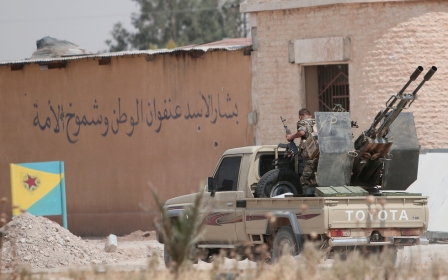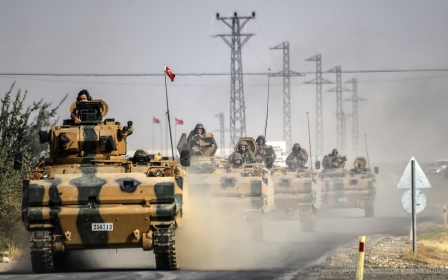Turkish forces clash with US-backed pro-Kurdish rebels in northern Syria

The Turkish military and allied Syrian rebel brigades clashed with the US-backed Syrian Democratic Forces (SDF) and pro-Kurdish People's Protection Units (YPG) in northern Syria on Saturday.
"Turkish tanks advanced today near Al-Amarneh in Aleppo province, south of the border, and clashes broke out between them and fighters backed by Kurdish forces," Syrian Observatory for Human Rights head Rami Abdel Rahman said.
According to the pro-SDF Manbij Military Council, Turkish forces also targeted positions of pro-SDF fighters in the village of Yusufbeg.
“The bombardment conducted by Turkish jets this morning left some Jarablus Military Council fighters injured, and these were taken under treatment in hospitals in Manbij," said the Council, in a statement released on the pro-Kurdish Firat News Agency, referring to the pro-SDF military grouping aimed at capturing Jarabulus.
It added that Turkey had "dangerously escalated its attacks by exploiting the silence of the world and international and regional temporary consensus for its blatant interference in Jarabulus in order to obstruct the war on terror," referring to Turkey's decision to enter northern Syria on Wednesday, ostensibly to drive Islamic State militants out of the border city of Jarabulus.
Fighters from the Turkish-backed Syrian rebel group Faylaq al-Sham also reported that several people had been killed after they clashed with the SDF south of Jarabulus on Saturday morning.
Turkish jets also carried out airstrikes on YPG/SDF positions south of Jarabulus, which was captured by Turkey and its allies on Thursday from IS.
The clashes are likely to be a headache for the US, who ostensibly support both sides involved in the fighting.
The SDF and YPG put out mixed reactions to the escalation on Saturday. A number of SDF component groups, including the Arab-majority Jaish al-Thuwwar, announced their intention to challenge the “Turkish occupation”:
However, another YPG commander stated on Twitter that his group would show restraint with regards to the Turkish forces and continue to focus on fighting IS.
“Regarding increased Turkish military attacks on our border positions in triple cantons (northern Syria), we continue to take on the restraint approach – refusing engagement despite the losses we suffer,” said YPG Derik Command, on the YPG's official Twitter account.
“To stabilise the north of the country, the goal remains fighting DAESH (IS) and not Turkish forces.”
Turkish Prime Minister Binali Yildirim on Friday also denied that Turkey's invasion of northern Syria was primarily focused on targeting the YPG rather than IS.
"They either know nothing about the world, or else their job is to report a bare-faced lie," Yildirim said when asked to comment on claims the operation was not targeting IS militants but Kurds. "Our soldiers' mission is to ensure our border security and the life and property of our citizens. The news apart from that is just a lie."
However, he told reporters on Friday that the operations would continue until IS "and all other terror elements are cleared from the area".
"As Gazi [Republic founder Mustafa Kemal Ataturk] said during the War of Independence, 'Either independence or death'," said Yildirim. "We will give the necessary response to these villains who targeted the fellowship and unity of 79 million people."
Turkish media reported Turkish artillery strikes on Thursday evening against a group of YPG soldiers just south of Jarabulus. The state-run news agency Anadolu called it warning shots against any sort of YPG adventure west of the Euphrates, which Turkey has called a red-line for the YPG's plans to expand its influence in northern Syria.
An Turkish official said on Wednesday that Ankara would "continue operations until we are convinced that imminent threats against the country's national security have been neutralised,” according to AFP.
Turkey views the YPG and its political wing the Democratic Union Party (PYD) as being an offshoot of the Kurdistan Workers' Party (PKK), which has been engaged in a long-running guerilla war with the Turkish state.
The US has supported the SDF in its fight against IS in northern Syria and has seen the group as crucial in the eventual push to drive IS out of their "capital" Raqqa.
However, on Wednesday, speaking at a press conference in Turkey alongside the prime minister, US Vice President Joe Biden said that the YPG would lose US support if they continued to spread westwards across the Euphrates river.
Following the comments, a YPG spokesperson appeared to indicate that they would comply with the US request and withdraw, although they also stated that SDF would remain.
However, YPG spokesperson Redur Xelil appeared to later contradict this.
“We are in the west of Euphrates and take our place within Syrian Democratic Forces,” he explained to Voice of America.
"We are in our own land and we will not leave it as per some request. We will not act in line with the request of Turkey or some other power.”
Airport attack
Meanwhile, on Saturday Kurdish militants fired four rockets at the airport in the southeastern Turkish city of Diyarbakir, without causing casualties, the Dogan news agency said.
The rockets landed in an empty area close to a police control post at the airport, causing explosions that were heard throughout the city and shattering windows.
Police were sent to the scene but there were no reports of either dead or wounded, the report said.
Dogan news agency said the attack was carried out by the Kurdistan Workers Party (PKK), which has fought the Turkish state for more than three decades.
Reports said that the road to the airport was closed and flights suspended after the rocket fire.
The southeast of Turkey has been wreaked by violence since the summer of 2015 when a two-and-a-half-year PKK ceasefire collapsed.
Stay informed with MEE's newsletters
Sign up to get the latest alerts, insights and analysis, starting with Turkey Unpacked
Middle East Eye delivers independent and unrivalled coverage and analysis of the Middle East, North Africa and beyond. To learn more about republishing this content and the associated fees, please fill out this form. More about MEE can be found here.




